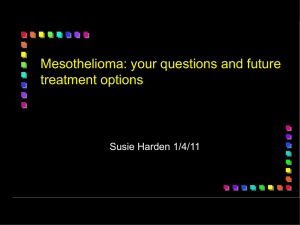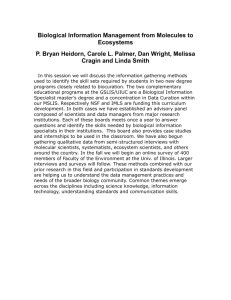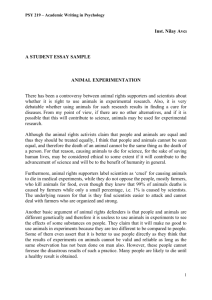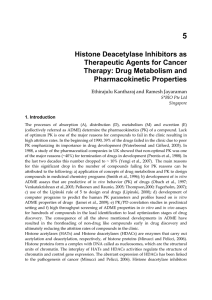Interview_with_Dr._Richon-July_2010___283435
advertisement
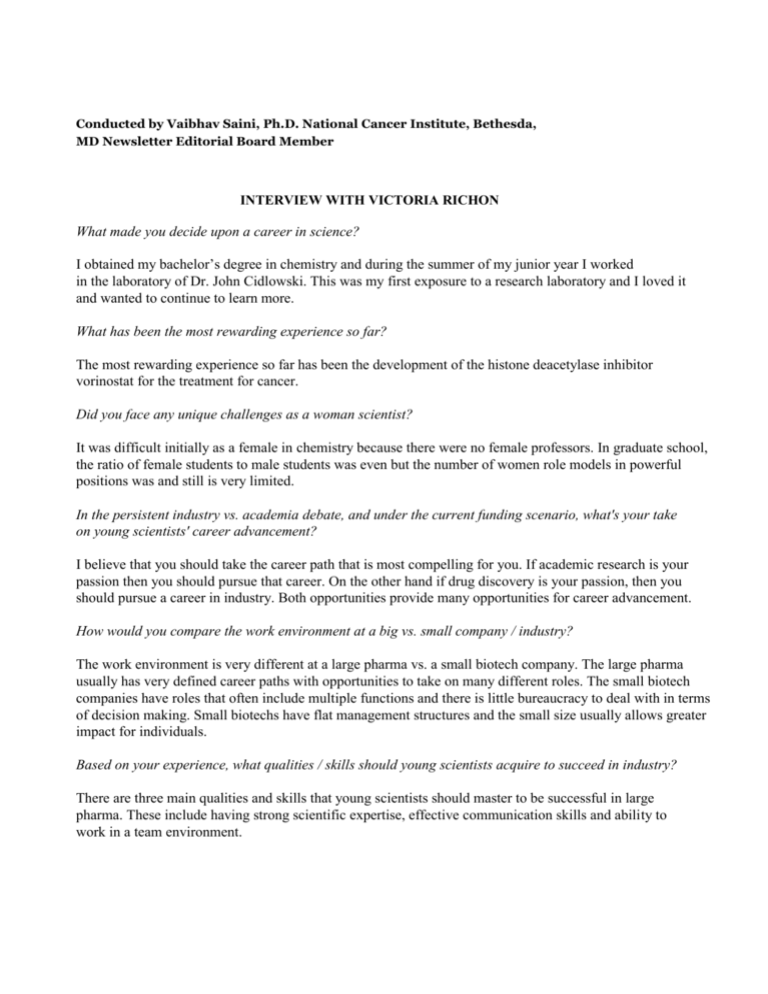
Conducted by Vaibhav Saini, Ph.D. National Cancer Institute, Bethesda, MD Newsletter Editorial Board Member INTERVIEW WITH VICTORIA RICHON What made you decide upon a career in science? I obtained my bachelor’s degree in chemistry and during the summer of my junior year I worked in the laboratory of Dr. John Cidlowski. This was my first exposure to a research laboratory and I loved it and wanted to continue to learn more. What has been the most rewarding experience so far? The most rewarding experience so far has been the development of the histone deacetylase inhibitor vorinostat for the treatment for cancer. Did you face any unique challenges as a woman scientist? It was difficult initially as a female in chemistry because there were no female professors. In graduate school, the ratio of female students to male students was even but the number of women role models in powerful positions was and still is very limited. In the persistent industry vs. academia debate, and under the current funding scenario, what's your take on young scientists' career advancement? I believe that you should take the career path that is most compelling for you. If academic research is your passion then you should pursue that career. On the other hand if drug discovery is your passion, then you should pursue a career in industry. Both opportunities provide many opportunities for career advancement. How would you compare the work environment at a big vs. small company / industry? The work environment is very different at a large pharma vs. a small biotech company. The large pharma usually has very defined career paths with opportunities to take on many different roles. The small biotech companies have roles that often include multiple functions and there is little bureaucracy to deal with in terms of decision making. Small biotechs have flat management structures and the small size usually allows greater impact for individuals. Based on your experience, what qualities / skills should young scientists acquire to succeed in industry? There are three main qualities and skills that young scientists should master to be successful in large pharma. These include having strong scientific expertise, effective communication skills and ability to work in a team environment. Do you have any specific recommendations for women scientists? The advice I would give to woman scientists and any scientist is as much as possible to know what you want in your career and seek a position that provides a path to your goals. Graduate school and postdoctoral research positions are good opportunities to experience different environments that can help one decide which career path to pursue. Secondly, and just as important and challenging, each person should strive to find a balance between your career and your personal life. BIOGRAPHY: Dr. Victoria Richon joined Epizyme in October, 2008 as Vice President of Biological Sciences. She joined Epizyme from the Merck Research Laboratories, Boston, where she was a Senior Director and headed up the Department of Cancer Biology and Therapeutics. Prior to Merck, Dr. Richon was a leading member of the scientific group at Sloan Kettering that discovered the histone deacetylase inhibitor vorinostat (SAHA). This discovery was the basis of Aton, a company that she co-founded and for which she served as Executive Director of Biology. Aton was acquired by Merck in 2004 and Dr. Richon continued supporting vorinostat through its approval by the U.S. FDA in October 2006 for the treatment of cutaneous manifestations in patients with advanced cutaneous T-cell lymphoma (CTCL), a form of non-Hodgkin's lymphoma. Marketed under the name Zolinza™, vorinostat is the first histone deacetylase inhibitor approved for the treatment of cancer. Dr. Richon has been a participating member of American Association for Cancer Research since 1993, serving on program committees for the AACR annual meeting, AACR special conferences as well as review committees for AACR fellowships. Dr. Richon received her BA in Chemistry from the University of Vermont and her Ph.D. in Biochemistry at the University of Nebraska. She conducted post-doctoral research at Memorial Sloan-Kettering Cancer Center. Victoria M. Richon, Ph.D. Vice President, Department Of Biology EpiZyme, Inc. 840 Memorial Drive Cambridge, MA 02139 Phone: (617) 401-8263 Fax: (617) 349-0707 E-mail: vrichon@epizyme.com
